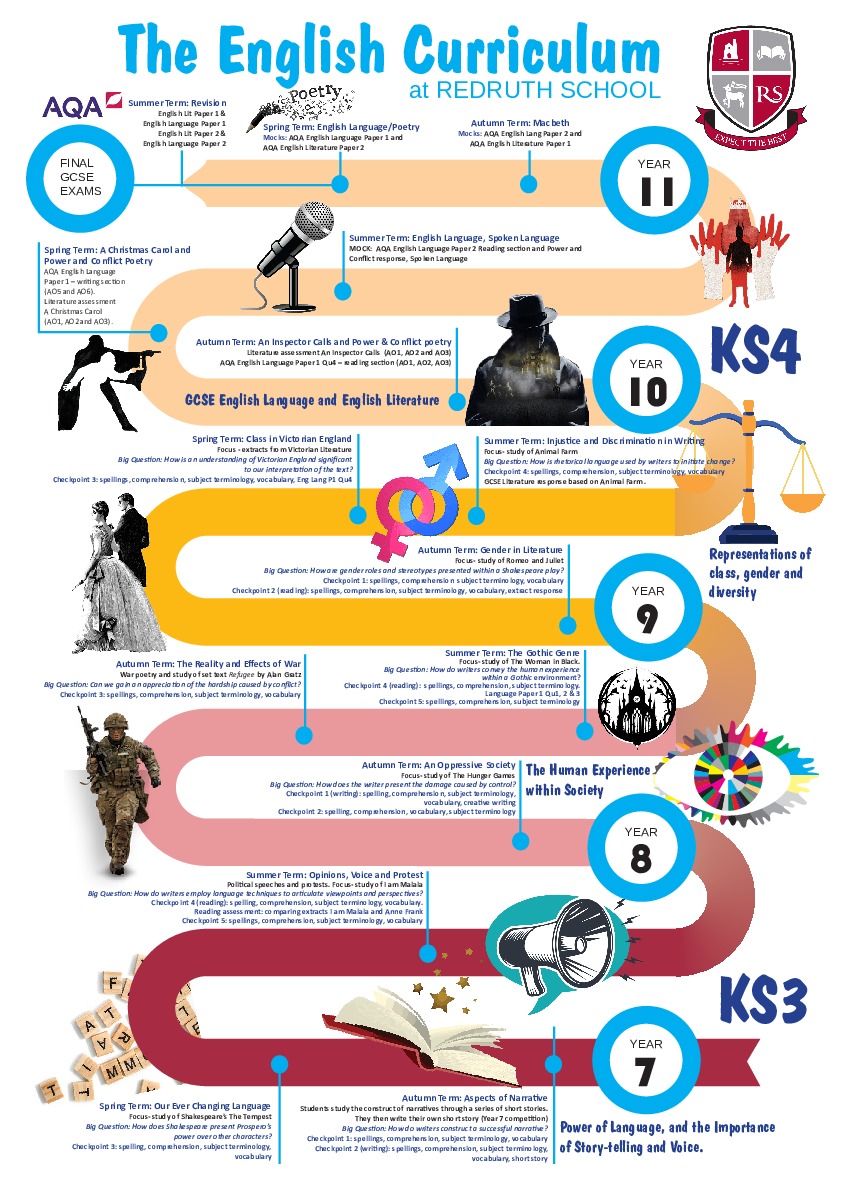- Home
- Students
- Subject Information
- English
- facebookShare this page on Facebook
- twitterTweet this page
- pinterestPin this page
English
Head of Subject: Mrs Meera Cornish
mcornish@redruth.cornwall.sch.uk
Welcome to Redruth’s English faculty.
English curriculum intent
At the heart of our curriculum is the belief that students engage and progress in English in a text-rich, passionate and responsive environment. Our curriculum journey has been carefully designed to allow students to practise a wide range of skills whilst exploring and developing their understanding of our language and literature within the contexts in which they were written. It is important to us that students understand the significance of the texts they are studying in terms of how it fits into a historical and political context, but also what it reveals about the human condition.

Please click on the links below to see the English journey for each year group:
What does the Key Stage 3 curriculum look like?
Our Year 7 curriculum units all sit under the umbrella theme of Power of Language, and the Importance of Story-telling and Voice. In the autumn term, students focus on Aspects of Narrative exploring a range of short stories and then creating their own. In the spring term, students study Our Ever Changing Language, which has a greater focus on analysing writers’ choice of language. In this unit, they will study The Tempest. In the summer term, the focus is on Opinions, Voice and Protest, which exposes students to a range of political texts and will culminate in the study of I am Malala, which will develop students’ understanding of rhetoric and build confidence in expressing their own opinions.
Having introduced the ways in which writers have used voice to express ideas in their Year 7 curriculum, the Year 8 curriculum aims to hone in on the Human Experience within Society, in order to tackle some more controversial areas of English. In the autumn term, students will explore The Reality and Effects of War, firstly through the study of some classic war poetry, and then focusing on the topical issue of refugees through the modern novel Refugee by Alan Gratz. In the spring term, students will build on their knowledge of suffering through the unit An Oppressive Society with an exploration of the dystopian genre. They will be exposed to excerpts from The Road and 1984 before applying their contextual understanding to the novel The Hunger Games. The themes explored in this unit will then be developed in their summer term unit of The Gothic Genre, where the focus will remain on the human experience and they will gain further understanding of classic texts such as Frankenstein and Dracula before applying this to the study of The Woman in Black.
In Year 9 the focus is on preparing students for Key Stage 4, whilst ensuring Key Stage 3 is a separate entity. Each unit is designed to give students a contextual foundation, which will introduce writers’ intentions, layers of meaning and ideas. They will study these units under the umbrella theme of Representations of Class, Gender and Diversity. They will begin by studying Class in Victorian England with a focus on Charles Dickens’ Great Expectations: this is purposely aimed at preparing students for their study of A Christmas Carol, whilst simultaneously allowing them to develop maturity in tackling issues about inequality and prejudice. These ideas will then be built upon in the spring term, where students will focus on Gender in Literature, exploring ideas about stereotypes and gender roles over time including exposure to Greek mythology and then focusing on Romeo and Juliet. These core themes will again be built upon in the summer term, where students will complete the unit Injustice and Discrimination in Writing. They will begin by revisiting themes from earlier in the year, but through non-fiction writing. We will then focus on harnessing skills and knowledge in preparation for Year 10 through the study of Animal Farm, which will act as a springboard for the study of An Inspector Calls.
What does the Key Stage 4 curriculum look like?
At Key Stage 4, all students are entered for GCSE English Language and English Literature. Students begin the course with the study of An Inspector Calls. Students continually switch between the two subjects, so they can see that the skills are transferable. A Christmas Carol and a selection of the Power and Conflict poetry is completed, as well as preparing for their Spoken Language element. They will begin the study of Macbeth and this will continue into Year 11. The remainder of Year 11 is dedicated to consolidating all the skills and knowledge required for the two sets on internal mocks, and for the GCSE examinations.
How can you support English learning at home?
- Literacy has become an ever-increasing focus at our school and the link between improved literacy and reading is incredibly strong. Encourage your son/daughter to read regularly and talk to them about what they’re reading. If they’re struggling to find a book they enjoy reading, encourage them to speak to their teacher or talk to somebody in the library to get suggestions.
- Asking your son/daughter to talk about their lessons and what they are learning will help them to develop confidence in expressing information and opinions, as well as consolidate their understanding and knowledge.
- All students have a knowledge organiser with key vocabulary and content for the unit they are studying. These can be found on 'Satchel One' and can be used to regularly quiz at home.
- Enquire after set homework, or check ‘Satchel One’ to make sure homework is completed on time.
- At Key Stage 4, encourage regular revision. BBC Bitesize and Seneca are particularly useful offering notes, video clips and test questions on a range of skills and texts.
- Students in Year 11 will have access to revision workbooks. These can be used for students to revise independently.


